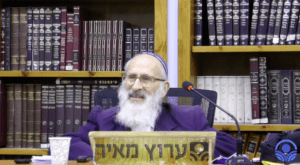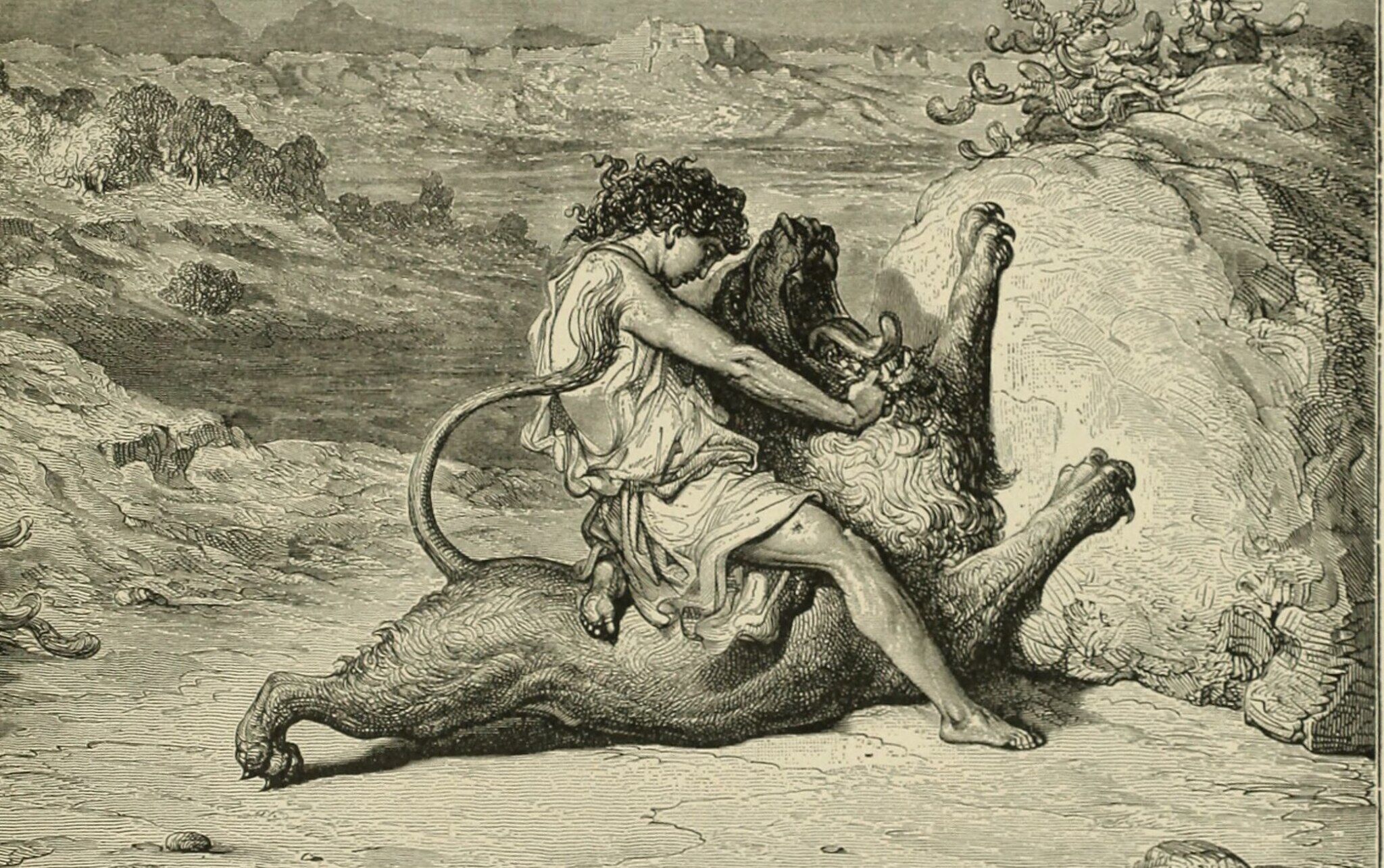Haftarah for Parashat Naso
by HaRav Shlomo Aviner

A Strange Hero
Shoftim 13:2-25
“For you will conceive and give birth to a son. No razor may be used on his head, for the boy is to be a Nazir of Hashem from birth, and he will begin the salvation of Israel from the hands of the Philistines” (Shoftim 13:5). This child was Shimshon, and he began to liberate Israel from under the yoke of the Philistines who ruled over our Nation (ibid. 11)
In order to understand the tragic reality of that time, we must remember that although the Nation of Israel was in the Land, they had absolutely no independence. They had already been oppressed by the rule of the Philistines for forty years. They did not have an army, and therefore had no possibility of beginning a war of independence. It was against this dismal background that Hashem had mercy on us and sent us the amazing figure of Shimshon.
This incredible man, who appears in the Book of Shoftim, is clearly different from other judges. He is in fact a rather strange man. Instead of acting as a judge, leader or military man, he engages in odd adventures: he knocks down gates and carries them on his back, he gets involved with Philistine women, he captures foxes and lights fires with them, he tells riddles and kills people in order to take their garments. What benefit is this to us? It is true that the Philistines caused us much distress, and any act of vengeance was justified, but there is a huge gap between these odd acts and the statement “And he judged Israel” (ibid. 16:31)
We cannot deny that this was a man who possessed incredible strength. He took the jaw of a donkey and killed one thousand men (ibid. 15:16). But instead of using his strength for the beneficial and constructive purpose of saving the Nation of Israel, he used it for personal adventure. Throughout his entire life he wandered around, with long hair like a hippie, detached from society, far from Judaism, living among the Philistines, marrying their daughters and using his strength for nonsense and vanities. He does not have a friend, Rabbi, supporters or students. So what could possibly explain his place in the Book of Shoftim?
It is true that Shimshon had long hair, but it was not due to his vanity. He was a Nazir, and was therefore prohibited from cutting the hair on his head. “And razor should not touch his head because the boy will be a Nazir of Hashem” (Shoftim 13:5). Furthermore, he was not only a Nazir, but a Nazir from birth. A Nazir is a supremely holy person, who raises himself above the simple, lowly and base matters that interest other people. Before Shimshon’s birth, an angel informed his mother: “He will be a Nazir of G-d.” But why? Wouldn’t it be preferable to give him the opportunity to decide on his own? Why do they decide for him? There is a special reason: He will not be elevated for his own personal righteousness and holiness – he can worry about this himself – but “The child will be a Nazir of Hashem from the womb, and he will begin to save Israel from the Philistines” (ibid. 13:5). This man’s role in life was to begin saving us from the Philistines. But did he need to be a Nazir for this purpose? It seems that one would need to be a military man, not a Nazir!
But there is more: not only was it divinely decreed that this man would be a Nazir, but also that he would possess “Ruach Ha-Kodesh” (Holy Spirit). “And the spirit of Hashem began to resound in the camp of Dan, between Tzorah and Eshta’ol” (ibid. v. 25). A “Ruach Ha-Kodesh” is not something which immediately appears and descends upon one who is not ready for it. It appears slowly, as part of an ethical, spiritual, emotional and intellectual elevation. After intense efforts, a Holy Spirit reveals itself little-by-little, while crumbs of spiritual awakening appear. Shimshon was in fact a very serious person, and the spirit of Hashem resounded within him. Perhaps he possessed a Holy Spirit at first, but was it later diminished? This is not so, for the text tells us three times that the Holy Spirit was within him. In the incident with the lion: “And the spirit of Hashem came mightily upon him, and he tore him apart as he would have torn a kid” (ibid. 14:6). He accomplished this with the Holy Spirit which rested upon him. Even after Shimshon had obligated himself to pay thirty garments if someone solved his riddle, it is written: “And the Spirit of Hashem came upon him, and he went down to Ashkelon, and slew thirty men of them and took their clothing” (ibid. 14:19). And much later: “And the spirit of Hashem came mightily upon him, and the cords that were on his arms became as flax that was burnt with fire and his bands melted off his hands” (ibid. 15:14)
The answer to the riddle of who Shishom was, and what purpose he fulfilled, is given by the text itself. After Shimshon married a Philistine women, causing great distress to his parents, the text says: “But his father and his mother did not know that it was from Hashem, and at that time, the Philistines ruled in Israel” (ibid. verse 4). During the time of Shimshon, there was no State of Israel, only the State of the Philistines, Philistina. It was therefore impossible to draft an army and organize a rebellion. People were not ready to rebel. Shimshon knew them well and knew that they were frightened. They were even ready to hand Shimshon over to the Philistines! When the Philistines demanded that Shimshon be handed over to them, “three hundred men from Yehudah went down” to capture him, “and they said to Shimshon: Don’t you know that the Philistines rule over us? What have you done to us?” (ibid. 15:11). It is extremely difficult to save Israel under such adverse conditions. He received an appointment as the Chief of Staff, but there was no army, and no one was ready to be drafted. How could he save them under these conditions? He therefore received an appointment from his gut, and had time to contemplate and plan. During Shimshon’s time, it was not the State of Israel against another country, but the Philistine State with limited autonomy for the Jews. There was therefore no possibility to wage war. So this was Shimshon’s plan:
- He would wage guerilla warfare in order to exhaust and weaken the Philistines until they could no longer bear it.
- He would work alone, since the Nation was not willing to join him.
- He would act without endangering the Nation of Israel in any way. It was not possible to wage a struggle under the flag of the State of Israel. The Philistines would certainly attack the Nation of Israel. Shimshon fought as if it was his own personal war on account of his youth. He did not wage war for the Nation of Israel – he had nothing to do with them and didn’t even live with them. He was not married to one of them but to a Philistine. Clearly then, his marriage was part of a Divine plan. But the Philistines solved his riddle and therefore were the recipients of his vengeance: he killed Philistines in order to pay them the garments that were due to them.
Shimshon was not an “individual” person, but rather he a “communal” person of Israel. He had nothing of his own: no house, no Torah learning, no wife. Everything he had belonged to the Nation of Israel. And everything he had he gave. “Hashem G-d, please remember me. And please strengthen me just once more, G-d, and let me avenge one of my two eyes” (ibid. v. 28). I fell, but perhaps precisely because of the fall, I can bring salvation to the Nation of Israel. I am not complaining. I accept the judgment I was given. I played with fire and got burned or, more precisely, I received an order to involve myself with fire and got burned. I therefore ask: “Let me die with the Philistines” (ibid. v. 30). I am not asking for life for myself. All of my life is for the sake of the Nation of Israel. Shimshon’s entire life was, in essence, in the category of “Let me die with the Philistines,” since it was entirely devoted to beginning “to save Israel from the Philistines” (ibid. 13:5). He sacrificed his entire life, made himself impure, and placed himself in complicated, compromising situations. Our Sages say in the Zohar that he even sacrificed his World to Come for this purpose (Zohar, Naso 127a).
Only one thing interested him: “Let me die with the Philistines.” Hashem in fact accepted his request, and on the day of his death, he struck the Philistines with an eternal blow to the point that they did not dare raise their hand against Israel for the next twenty years. Although Shimshon stumbled, because of this fall, he was able to bring great salvation to Israel that outlasted his own lifetime.






